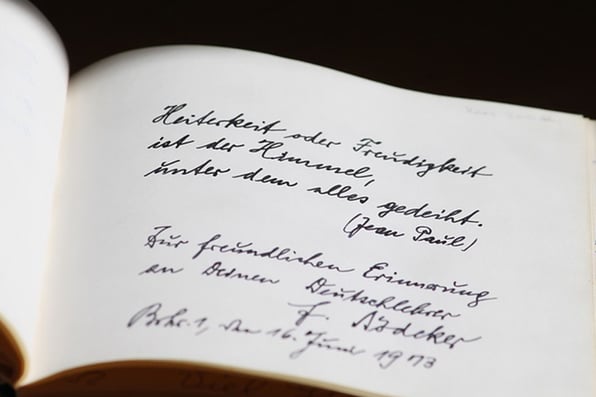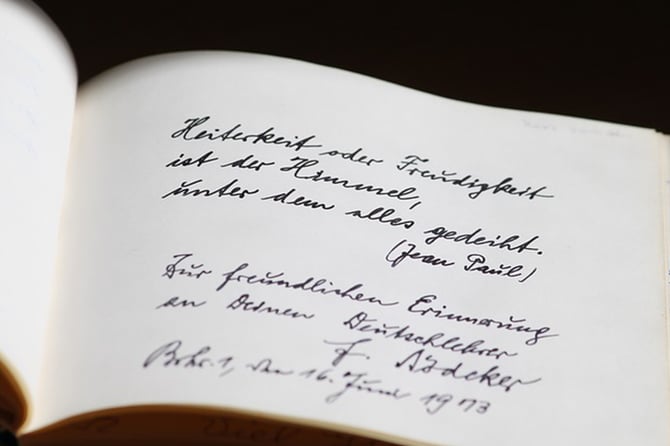
62 Differentiated Poetry Lessons for Elementary, Middle, and High School Students
Teach your students how to analyze poetry with these leveled texts

Poetry is powerful, but can often be confusing for students who have difficulty interpreting symbolism. To get your students' poetry gears turning, try our differentiated lessons for grades 4-12. Use the included writing prompts to encourage classroom discussion and written arguments. And once students have completed their poetry analyses, encourage them to write or perform their own poems!
Poetry Lessons:
- How does Dickinson view the changing of summer to autumn?
- Grade 3
- How does the poet use personification to describe how a shadow works in humorous ways?
- Grade 3
- How does Swenson use techniques such as repetition, rhythm, and rhyme to show the joy of playing baseball?
- Grade 3
- What do the images of the fox show readers about his character that the words of the poem do not?
- Grade 3
"Joy Sonnet in a Random Universe"
- How does the poem express joy with words and sound?
- Grade 3
- What is one theme in "The Star-Spangled Banner" that the author wants readers to consider as they reflect on the United States?
- Grade 3
- How are Dr. Seuss and Shel Silverstein similar and different?
- Grades 3-5
- FREE Additional Reading Practice lesson
- How does Stevenson capture an observation about how children think of the world through the speaker’s questions to the wind?
- Grade 4
- How does Edgar Albert Guest use sound and repetition to show the power of the setting your mind to something?
- Grade 4
- How does the poet use familiar images to describe Hercules, a mythological character who fought epic battles with mythical beasts?
- Grade 4
"When Johnny Comes Marching Home Again"
- What does the author want his readers to understand about war or the roles young men play in it from "When Johnny Comes Marching Home Again"?
- Grade 4
- What values of the United States does the poem explain?
- Grade 4
- How does "Jabberwocky" show readers how sound can create meaning and imagery, even when the words don't make sense?
- Grade 5
- In “Seashell,” what does Federico Garcia Lorca convey about the power of sharing a souvenir with someone?
- Grade 5
- Using the personification of a page, or sheet of paper, what does Lyon say writing can do for a person?
- Grade 5
- What is one theme in "The Slave-Martyr" that the author wants readers to consider as they reflect on the heroic actions of one slave?
- Grade 5
- How does Bly’s speaker feel about viewing an eclipse?
- Grade 5
- Based on the facts of the poem, all the facts of the poem, and nothing but the facts of the poem, does the poet want us to believe that the base stealer ultimately made it home?
- Grade 6
- How does the poet use sound to convey the beauty of his lost love?
- Grade 6
"The Charge of the Light Brigade"
- What is the greatest difference between what you could "see" and "hear" while listening to the recording of the poem versus reading it?
- Grade 6
- How did Walt Whitman change poetry as the world knew it?
- Grades 6-8
- FREE Additional Reading Practice lesson
"When I Heard the Learn’d Astronomer"
- How do you interpret Whitman’s poem exploring whether it is better to experience nature with our heads or with our hearts?
- Grade 6
- What do the sounds and images in Melville's poem tell us about his feelings toward war?
- Grade 6
- How do Rueben Bright’s actions reveal how he feels about his loss?
- Grade 6
- Does reading aloud or reading silently do a better job of helping the reader understand the speaker's experience?
- Grade 7
- How does the poet use sounds to convey the conflict the speaker explores in the poem?
- Grade 7
- In this poem, what commentary about the relationship between humans and animals does Clifton make?
- Grade 7
- How does Neruda use figurative language to help us understand his views on art?
- Grade 7
- What does the speaker in Millay’s sonnet think about traditional male-female roles?
- Grade 7
- How does Walt Whitman use imagery, rhythm, and rhyme in "Beat! Beat! Drums!" to explore the impact of war?
- Grade 7
- What particular human experience does Thomas call the reader’s attention to in “The Owl”?
- Grade 8
- How does Walt Whitman use contrasting images and repetition to comment on the harsh reality of the Civil War?
- Grade 8
"He Wishes for the Cloths of Heaven"
- Based on the facts of the poem, do you think the speaker will be successful in appealing to his beloved with the metaphors he chooses?
- Grade 8
Paired Poetry: "Invictus" and "Much Madness Is Divinest Sense"
- Compare and contrast the way the two poets use rhyme, alliteration, and assonance to convey the theme of personal strength.
- Grade 8
- What do both of these poems reveal about Shakespeare’s feelings toward his beloved?
- Grade 8
"The Weight of the World" and "Atlas"
- What can modern retellings of Atlas’s story teach readers about carrying burdens?
- Grade 8
- How does Keats use the myths of ancient Greece to communicate his feelings about love?
- Grade 8
- In his poem about parenting and growing up, “The Exposed Nest,” what theme does Frost explore?
- Grade 9
- How does the poet use concrete, sensory language to help readers recall or understand what intense love emotions might feel like?
- Grade 9
- How does the author communicate the difficulty of imprisonment and the power of the human spirit in his poem "To Althea From Prison" using elements of sound?
- Grade 9
- Which form of the poem, written or recorded, best conveys the loss felt by the speaker?
- Grade 9
Poet Laureate: "The Pen ... An Instrument of Discovery"
- Using Billy Collins as an example, how does the author comment upon the ways in which poetry has been taught and perceived in popular culture?
- Grades 9-10
- FREE Additional Reading Practice lesson
- How does Whitman convey the challenges of the veteran's experience after the war is over?
- Grade 9
- How does Wordsworth use the past to show the current issues in “London, 1802”?
- Grade 9
- How does the poet use figurative language to show readers what he means by “One could do worse than be a swinger of birches”?
- Grade 10
- How does Landon use sound to convey her emotions toward her former love?
- Grade 10
- What commentary or observation does the poet make about life, death, and dignity through the choice made by the speaker in the poem “Hurt Hawks”?
- Grade 10
- What does the speaker in McKay’s sonnet suggest about those people who are persecuted?
- Grade 10
"A March in the Ranks Hard-Prest and the Road Unknown"
- How does Whitman use the contrasting sensory images in the poem to convey the nature of what it means to be a soldier in "A March in the Ranks Hard-Prest, and the Road Unknown"?
- Grade 10
- How does the poet use images to reveal the Vietnam War Memorial's personal, political, and cultural meaning and the effect it has on visitors?
- Grade 11
- How does the poet convey the drama of his romance using elements of sound?
- Grade 11
"This Life Which Seems So Fair"
- How does Drummond’s simile allow him to express his beliefs about the way humans ought to approach thinking about the fleeting nature of life?
- Grade 11
"Using Poetry to Raise Awareness About Malaria"
- What caused the author to write a book of malaria poetry, and what were the effects of that decision?
- Grades 11-12
- FREE Additional Reading Practice lesson
"I Wandered Lonely as a Cloud"
- In the poem "I Wandered Lonely as a Cloud," what commentary does Wordsworth provide on nature and the power of the imagination?
- Grade 11
- What does Shelley’s sonnet suggest about the effects time has on people, political power, and art?
- Grade 11
"It Feels a Shame to Be Alive"
- What two themes does Emily Dickinson develop as she conveys observations and commentary about soldiers at war?
- Grade 11
- How does the poet use the sound of poetry to convey her emotions about death?
- Grade 12
- After reading "The Thrush's Nest," describe at least two central observations the poet makes about nature and the human experience using the image of the birth of baby birds.
- Grade 12
Two Versions of "The Chimney Sweeper"
- How does William Blake manipulate the persona of a child's voice to develop a social commentary on the plight of chimney sweepers?
- Grade 12
"I Dwell in Possibility (657)" and "Tell All the Truth but Tell It Slant (1129)"
- According to the speaker, what can poetry do that prose and other forms of communication cannot do?
- Grade 12
- How does the poet use the images of changing seasons to help readers reflect on what it means to grow up?
- Grade 12
"The Dying Words of Stonewall Jackson"
- What two themes about serving one's country does Sidney Lanier develop in the poem "The Dying Words of Stonewall Jackson"?
- Grade 12

Mallory Busch is ThinkCERCA's Editor of Content Strategy. A graduate of Northwestern University, Mallory came to ThinkCERCA from stops in audience strategy at TIME magazine and news applications development at Chicago Tribune and The Texas Tribune. She holds degrees in Journalism and International Studies, and was a student fellow at Knight Lab in college.
